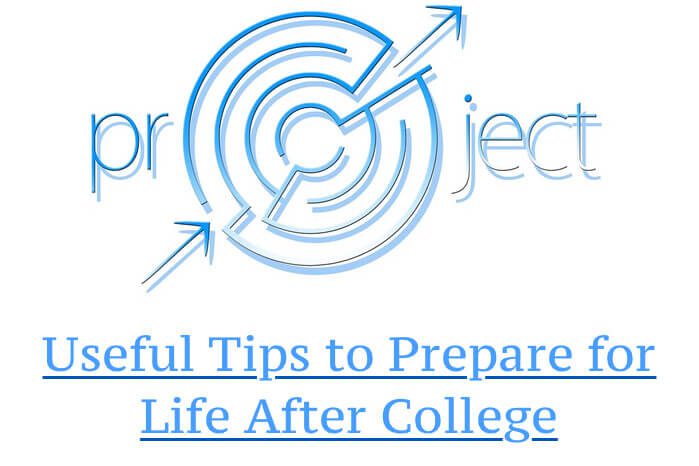Tips to Prepare for Life After College
Graduation is imminent, and we have 12 tips to help you transition to post-college life. It is safe to say that every student dreams of the graduation ceremony and graduation party to symbolize a cycle’s completion. But, as soon as this rite of passage occurs, a new and important chapter begins in each of the trainees’ lives. We wanted a different reality, but the scenario points to over-competing markets. So, getting ready never hurts. Hence, it is worth asking: what comes after graduation? Is there life after graduation? Think about it now so that your life’s next cycle is as incredible as the graduation period.
In this article, we will give you some tips to help you start with full force your planning for your professional career after graduation. Below we have listed some tips for you to prepare for life after graduation.

Build your network
On your quest to secure a job, you need to establish a network of people you know, which will include friends, family, college mates, neighbors, lecturers, etc. These individuals will likely have a connection with you that will help in securing a job. Build your network portfolio by keeping in touch with individuals you meet in class or during an internship. This may likely help you secure a job that you may likely not have been opportune to get. It is also important for you to join your school’s alumni association to leverage it for networking.
Take advantage of job fairs and the job board
It is important for you to attend events organized while in school because you can use it to expand your network. Take, for instance, attending a job fair organized by your institution can lead you to meet representatives from your dream job. The job fair can also help you understand the job market of your discipline better.
If your school has a career development center, take advantage of its resources before reaching your senior year. It’s an amazing resource that can help you build a resume, do mock job interviews, get career advice, or seek professional internships that give you an edge during your graduate job search.
Find a mentor
At the beginning of your professional life, having a mentor can be the easiest way of navigating the difficulties that come with the job as your mentor provides insight into what is required to become successful. A mentor can be a professor with relationships in your field, a former boss, or even a family friend. Who you choose as a mentor will depend on your field of interest and career desire.
It would be ideal to ask your mentor on the path you want to take while being mentored to avoid making costly mistakes.
Polish your social media presence
With the digital age, many students are now conversant with social media, however, very few are familiar with the idea of building a digital presence for the corporate world. Towards graduation, you must create a professional social media presence on LinkedIn and start adding to your growing network.
In addition to the above, your other social media accounts should also speak well and highly of your personality. Nowadays, potential employers go through social media pages to view the personality they want to employ, and having a negative social media presence can affect your chances.
You don’t have to remove all the posts on your social media pages; just make sure those accounts give a good account of who you are to anyone who comes across it.
Begin your job search
During your ultimate year in college, start looking for jobs; searching for jobs before you graduate cannot be emphasized enough. Some fields, such as finance, expect their candidates to start from junior year. During the last year and particularly the last semester, keep an eye out for low-level positions for which you are qualified.
Leverage on the network you have built and job boards to advance your interest as they may have information about job openings that are not yet public.
Have financial goals
Anyone who wants to improve their relationship with money after college needs to start by setting their financial goals. They should reflect two main points: what consumption pattern you expect to have and your financial goals for the future.
Want a tip? It is worth giving up some expenses today to have more quality of life and comfort in the coming years. So try to reduce your consumption pattern during college. One of the advantages is being able to invest more in your career when the course is over.
Let’s assume that one of your goals is exactly to save an amount for your professional career. At the end of college, this amount can be used to get more certified, change cities in search of opportunities, or even travel to another country.
Build a budget
Once you have established your financial goals, it is important to record this in a budget. This tool organizes your expenses and the amounts set to be saved. Therefore, it helps with a financial balance over the months.
By closely monitoring your budget, you can see how much can be spent in each category – such as food, transportation, leisure, etc. It is also feasible to make small adjustments to decrease costs on one side and increase.
In addition to setting up your budget, another key strategy is to keep a record of your expenses constantly. This can be done through a financial control application. It divides all your notes by category and generates very useful graphical analyzes to understand your consumption.
Think about retirement
This next tip will sound strange to you; however, we advise that you start planning towards your retirement. Strange right? Indeed it is strange to start saving for retirement when you are just about to start your life; however, it’s the best time to start a retirement investment account. By making regular retirement contributions (aim for 10 percent of your income) at an early age, you allow your funds to grow for decades as your investments grow over time.
Things to Do Before Graduation
Use holidays wisely
Summer holidays are not just for planning the carnival. It is worth taking some time to look for the best jobs and dedicate yourself to career planning. In addition to projecting the future, recess periods are good opportunities for other cool initiatives such as short courses, which are affordable and can represent a beautiful boost in the curriculum. Another idea is to delve into something specific in your area of expertise. Creating a blog or YouTube channel can be a way of exercising what was learned in college.
Explore different areas
A good way to start your career on the right foot is to focus on a certain aspect or function of the chosen area. However, closing yourself too much is not good for anyone. Finding balance doesn’t have any great secrets; roll up your sleeves and explore other fields.
Want to see an example? What prevents you from studying more about finance? Perhaps it has nothing to do with the profession to be followed, but the knowledge gained can be useful for the rest of your life. The same goes for courses focused on other skills like leadership and computer programming.
Make a complete projection
One of the big job interview clichés can inspire you to start long-term planning. What is the cliché you may be wondering; it is the big question where do you imagine yourself ten years from now?
This question, often seen as a joke, is very useful for anyone looking to project their careers accurately. Of course, trying to imagine your career outlook a decade ahead is important, but the young person must pave the way there. And in a year? Or even a month from now.
Career planning should include short, medium, and long term goals. This will help you to build a path and consolidate it over time. Another advantage is the personal satisfaction – which translates into motivation – gained from meeting the goals.

